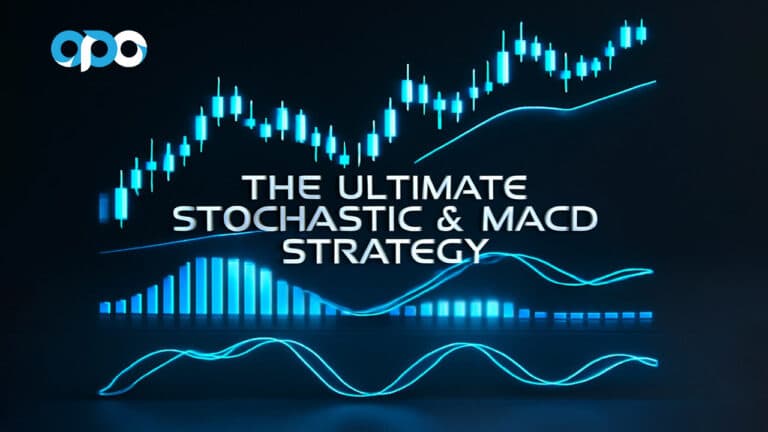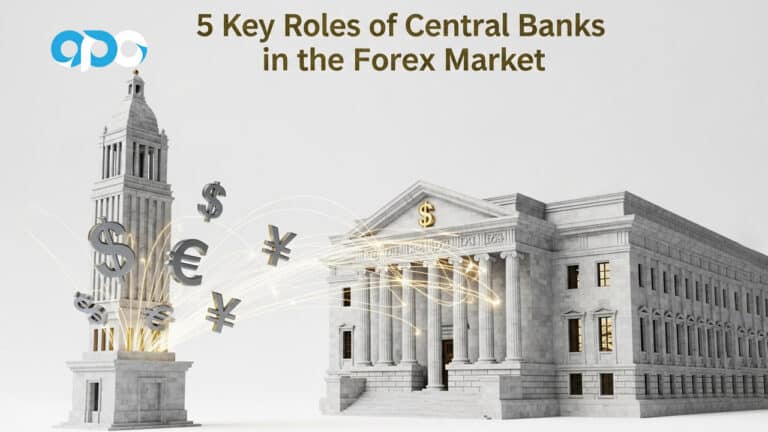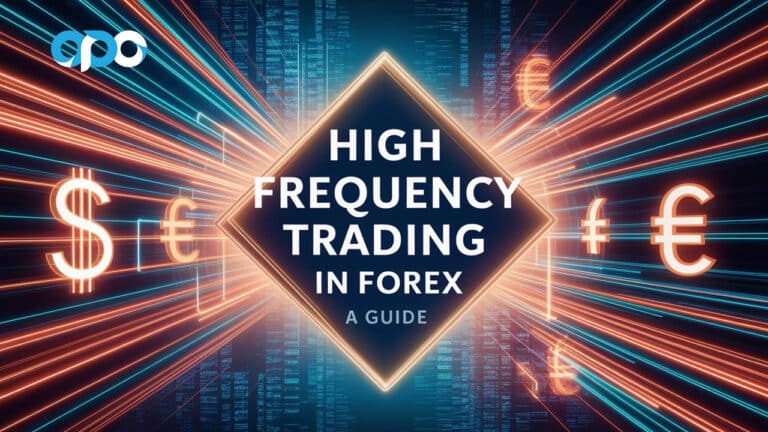Forex Futures trading is a popular avenue for day traders who seek to leverage currency price movements to make profits. Unlike traditional forex trading, which involves trading currency pairs directly, Forex Futures contracts allow traders to buy or sell a set amount of a currency at a predetermined future date and price. This market operates 24/7, offering numerous opportunities for traders worldwide. Selecting a trustworthy online forex broker is crucial for participating effectively in this market

Day trading Forex Futures can be particularly appealing due to its potential for quick profits and the absence of overnight risk, making it an attractive choice for both novice and experienced traders. In this comprehensive guide, we will explore the essential skills, required knowledge, psychological aspects, and strategies for Forex Futures trading. We will also discuss the importance of practice, continuous learning, and avoiding common mistakes. Finally, we will cover the necessary certifications for those looking to work as professional Forex Futures traders in companies.
Essential Skills for Forex Futures Trading
Technical analysis
Technical analysis is a cornerstone of successful Forex Futures trading, allowing traders to make informed decisions by studying historical price data. By analyzing patterns and trends that emerge from historical data, traders can predict future price movements and identify trading opportunities. This comprehensive guide delves into the key tools and advanced techniques used in technical analysis.
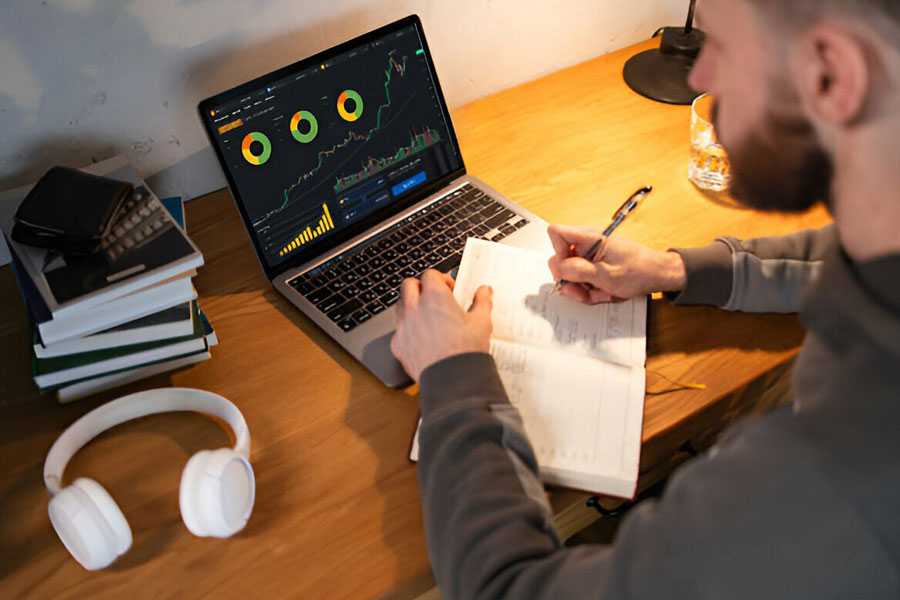
Fundamental Tools in Technical Analysis
Moving Averages: Moving averages (MA) are vital in technical analysis, smoothing out price data to identify trends over a specified period. Types of moving averages include:
- Simple Moving Average (SMA): Calculates the average price over a specified number of periods, giving equal weight to each period.
- Exponential Moving Average (EMA): Gives more weight to recent prices, making it more responsive to new information. Traders use MAs to identify support and resistance levels and generate buy and sell signals when prices cross the moving average lines.
Relative Strength Index (RSI): RSI is a momentum oscillator that measures the speed and change of price movements. Ranging from 0 to 100, it helps identify overbought or oversold conditions:
- Above 70: Indicates overbought conditions, suggesting a potential downward correction.
- Below 30: Indicates oversold conditions, suggesting a potential upward correction. RSI confirms trends and spots potential reversal points.
Fibonacci Retracements: Fibonacci retracement levels, based on key numbers identified by mathematician Leonardo Fibonacci, help identify potential reversal levels by drawing horizontal lines at key Fibonacci levels (23.6%, 38.2%, 50%, 61.8%, and 100%) of the previous price move. These levels predict areas where the price might find support or resistance, crucial for determining entry and exit points in trades.
Read More: Risk management principles for both novice and advanced traders
Advanced Techniques in Technical Analysis
Candlestick Patterns: Candlestick charts display the high, low, open, and closing prices of a security for a specific period. Recognizing patterns such as Doji, Hammer, and Engulfing patterns provides insights into market sentiment and potential reversals:
- Doji: Indicates indecision in the market.
- Hammer: Suggests a potential bottom.
- Engulfing: Signals a potential reversal. These patterns help traders anticipate market movements and make informed decisions.
Bollinger Bands: Bollinger Bands measure market volatility, consisting of a middle band (a simple moving average) and two outer bands (standard deviations from the moving average). They expand and contract based on market volatility:
- Bands Close Together: Indicates low volatility.
- Bands Far Apart: Indicates high volatility. Bollinger Bands identify overbought or oversold conditions, potential breakout points, and trends.
Ichimoku Cloud: The Ichimoku Cloud, or Ichimoku Kinko Hyo, provides information on support and resistance levels, trend direction, and momentum. It consists of five lines:
- Tenkan-sen (Conversion Line)
- Kijun-sen (Base Line)
- Senkou Span A (Leading Span A)
- Senkou Span B (Leading Span B)
- Chikou Span (Lagging Span) The area between Senkou Span A and B forms the ‘cloud,’ representing support and resistance levels. Price above the cloud indicates an uptrend, while price below the cloud indicates a downtrend.
MACD (Moving Average Convergence Divergence): MACD is a momentum indicator that helps traders understand the relationship between two moving averages of prices. It consists of:
- MACD Line: Difference between the 12-day and 26-day EMA.
- Signal Line: 9-day EMA of the MACD line.
- Histogram: Difference between the MACD line and the signal line. MACD line crossing above the signal line generates a buy signal, while crossing below generates a sell signal.
Specialized Technical Analysis Methods
Inner Circle Trader (ICT) Techniques
Inner Circle Trader (ICT) techniques are a set of strategies that focus on understanding market maker methodologies and smart money principles. These techniques delve into the psychology of trading and aim to identify the footprints of institutional traders to gain an edge in the market. Here’s a closer look at some ICT techniques:
- Liquidity Zones: ICT emphasizes identifying liquidity zones where significant market activity occurs. These zones represent areas of accumulation or distribution by institutional traders. By recognizing liquidity zones, traders can anticipate potential market movements and align their trades accordingly.
- Order Blocks: Order blocks are areas on a price chart where large institutional orders have been placed, causing significant price movements. These blocks often serve as support or resistance levels and can influence future price action. ICT techniques help traders identify and analyze order blocks to make informed trading decisions.
Smart Money Concepts (SMC)
Smart Money Concepts (SMC) revolve around understanding the activities of large institutional traders, often referred to as “smart money.” These traders have the capacity to influence market movements and leave distinctive patterns in price action. Here are key components of SMC:
- Market Structure: SMC focuses on analyzing market structure to identify trends and reversals. By examining price action and volume, traders can discern the underlying market dynamics and anticipate future price movements.
- Liquidity Grabs: Liquidity grabs occur when institutional traders manipulate prices to trigger stop-loss orders or to accumulate or distribute positions. SMC techniques help traders recognize liquidity grabs and interpret their implications for future price action.
- Order Blocks and Mitigation: Order blocks are critical levels on a price chart where large orders are executed. Traders often observe order blocks to gauge potential support or resistance levels. Mitigation refers to the re-entry of institutional traders into the market to manage risk. SMC techniques assist traders in identifying order blocks and understanding mitigation patterns.
Read The Market (RTM)
The Read the Market (RTM) method involves several key components that traders use to analyze and interpret market behavior:
- Price Action:
- Candlestick Patterns: Observing formations such as dojis, hammers, and engulfing patterns to predict future price movements.
- Support and Resistance Levels: Identifying key levels where price tends to reverse or consolidate.
- Volume Analysis:
- Volume Spikes: Detecting unusual increases in trading volume to signal potential market reversals or breakouts.
- Volume Trends: Analyzing overall volume trends to confirm the strength of a price movement.
- Market Sentiment:
- Sentiment Indicators: Utilizing tools like the Fear and Greed Index to gauge overall market emotions.
- News Analysis: Monitoring news and economic reports to understand the broader market mood.
- Order Flow:
- Order Book Analysis: Examining the depth of market orders to see the real-time buying and selling interest.
- Tape Reading: Watching the time and sales data to track the flow of large orders and their impact on price.
- Supply and Demand:
- Zone Identification: Pinpointing areas where supply and demand are out of balance, leading to potential price movements.
- Market Phases: Understanding accumulation, distribution, mark-up, and mark-down phases in the market.
- Technical Indicators:
- Moving Averages: Using moving averages to smooth out price data and identify trends.
- Oscillators: Employing indicators like the Relative Strength Index (RSI) to detect overbought or oversold conditions.
- Market Structure:
- Trend Analysis: Identifying whether the market is trending or ranging.
- Pattern Recognition: Recognizing chart patterns such as head and shoulders, triangles, and flags.
These components work together to give RTM practitioners a comprehensive view of market dynamics, enabling them to make more informed trading decisions.
Read More: Futures Trading in Forex
Fundamental Analysis in Forex Futures Trading
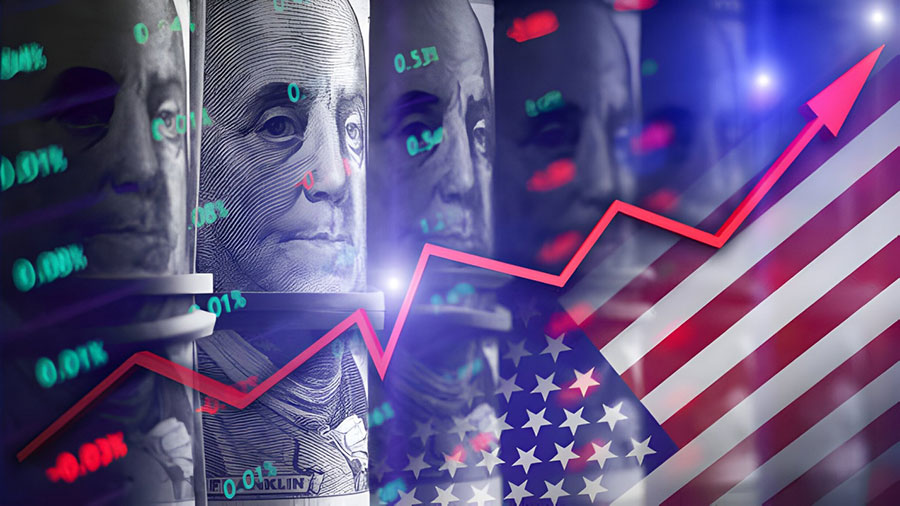
Understanding fundamental analysis is essential for success in Forex Futures trading. While technical analysis focuses on historical price data and chart patterns, fundamental analysis delves into the economic factors shaping currency and futures markets. By analyzing macroeconomic indicators, geopolitical events, and market sentiment, traders can assess the intrinsic value of assets and make informed trading decisions. Let’s explore fundamental analysis in greater detail, its application in Forex Futures trading, and how it contributes to becoming a skilled trader in this dynamic market.
Macroeconomic Indicators: Key Drivers of Market Movement
- Interest Rates: Central banks’ decisions on interest rates play a pivotal role in Forex Futures trading. Higher interest rates typically strengthen a currency by attracting foreign investment, while lower rates may lead to depreciation. Traders keenly monitor central bank announcements and economic reports for signals about potential changes in interest rates.
- Gross Domestic Product (GDP): GDP measures the total value of goods and services produced within a country’s borders. Strong GDP growth signals a healthy economy and often leads to currency appreciation. Conversely, weak GDP growth can result in currency depreciation. Traders scrutinize GDP reports to gauge the overall economic health of a nation.
- Employment Data: Employment indicators such as non-farm payrolls and unemployment rates provide critical insights into labor market conditions. Low unemployment and robust job creation typically correlate with economic growth and currency strength. Traders closely analyze employment reports to assess the direction of a country’s economy.
- Inflation Indicators: Inflation, the rate of increase in the general price level of goods and services, significantly impacts currency valuations. Traders rely on inflation reports, such as the Consumer Price Index (CPI) and Producer Price Index (PPI), to gauge inflationary pressures. High inflation can erode purchasing power and lead to currency devaluation.
- Trade Balance: The trade balance reflects the difference between a country’s exports and imports. A trade surplus occurs when exports exceed imports, strengthening the currency, while a trade deficit occurs when imports surpass exports, leading to currency depreciation. Traders closely monitor trade balance reports to assess a nation’s trade competitiveness.
Geopolitical Events: Navigating Uncertainty
- Political Stability: Political stability is crucial for economic growth and investor confidence. Traders carefully assess geopolitical events and their potential impact on currency markets. Political uncertainty, conflicts, and regime changes can lead to heightened volatility and uncertainty in Forex Futures trading.
- Trade Relations: Trade agreements, tariffs, and trade disputes between nations can significantly influence currency valuations. Positive developments in trade relations can bolster a country’s currency, while trade tensions may weigh on its value. Traders closely follow trade negotiations and policy announcements for potential market-moving events.
Market Sentiment: Understanding Investor Behavior
- Risk Appetite: Market sentiment reflects investors’ attitudes toward risk. During periods of risk aversion, investors flock to safe-haven assets such as the US dollar and gold, driving currency appreciation. Conversely, during risk-on periods, investors may seek higher-yielding assets, leading to currency depreciation. Traders gauge market sentiment through sentiment surveys, news sentiment analysis, and market positioning data.
- Economic Outlook: Traders assess economic indicators, central bank statements, and economic forecasts to form expectations about future economic performance. Positive economic outlooks can support currency appreciation, while negative outlooks may lead to currency depreciation. Traders adjust their trading strategies based on evolving economic conditions and market expectations.
Application in Forex Futures Trading: Building a Competitive Edge
- Long-Term Trends: Fundamental analysis helps identify long-term trends in currency and futures markets based on underlying economic factors. By analyzing macroeconomic indicators and geopolitical events, traders can anticipate long-term currency movements and position themselves accordingly.
- News Trading: Fundamental analysis is particularly valuable for news trading, where traders capitalize on market-moving events such as central bank announcements, economic releases, and geopolitical developments. Being able to interpret and react swiftly to fundamental news is crucial for success in Forex Futures trading.
- Intermarket Analysis: Fundamental analysis complements technical analysis and intermarket analysis, which examines the relationships between different asset classes. Traders analyze correlations between currencies, commodities, stocks, and bonds to identify trading opportunities based on fundamental and technical factors.
By mastering fundamental analysis, traders can gain a deeper understanding of the forces driving Forex Futures markets and make well-informed trading decisions. Whether you’re just starting your journey to becoming a Forex Futures trader or seeking to enhance your existing skills, a solid grasp of fundamental analysis is indispensable. Embrace the complexities of fundamental analysis, stay attuned to economic developments, and leverage this knowledge to navigate the intricacies of Forex Futures trading successfully.
Risk Management in Forex Futures Trading: Mitigating Potential Losses

Risk management is a critical aspect of Forex Futures trading, essential for safeguarding capital and ensuring long-term success in the market. Effective risk management involves identifying, assessing, and mitigating risks associated with trading activities. Let’s delve into a detailed exploration of risk management strategies, considering the following key considerations:
1. Position Sizing:
Determining the appropriate position size is paramount in managing risk. Traders should calculate position sizes based on their account size, risk tolerance, and the specific trade setup. Consider the following example:
Example: Suppose a trader has a $50,000 trading account and adheres to a fixed fractional position sizing strategy with a risk per trade of 2%. For a trade with a stop-loss of 50 pips, the maximum allowable loss per trade would be $1,000 ($50,000 * 2%). The trader calculates the position size to limit the risk to $1,000, given the stop-loss level and pip value of the currency pair being traded.
2. Stop-Loss Orders:
Implementing stop-loss orders is crucial for limiting losses and preserving capital. A stop-loss order specifies the price at which a trade will be automatically exited if the market moves against the trader’s position. Key considerations for setting stop-loss orders include:
Example: Suppose a trader enters a long position on EUR/USD at 1.2000 and sets a stop-loss order at 1.1950, 50 pips below the entry price. This stop-loss level represents the maximum acceptable loss for the trade. If the market moves against the trader and reaches 1.1950, the trade will be automatically exited to limit losses.
3. Diversification:
Diversifying trading strategies and asset classes can help spread risk and reduce portfolio volatility. Traders can diversify in the following ways:
Example: A trader employs a diversified approach by allocating capital across different currency pairs and futures contracts. Instead of focusing solely on one market, the trader trades multiple instruments to spread risk across various assets. This diversification strategy helps mitigate the impact of adverse price movements in any single market.
4. Risk Assessment:
Regularly assess and reassess risk exposure to ensure that trading activities align with risk tolerance and objectives. Consider the following risk assessment practices:
Example: A trader conducts a periodic review of trading performance and risk exposure. By analyzing trading data over the past month, the trader identifies areas of improvement and adjusts position sizes or trading strategies accordingly. This ongoing risk assessment process helps optimize risk management and enhance trading performance.
5. Psychological Considerations:
Managing psychological factors is integral to effective risk management. Emotions such as fear, greed, and overconfidence can lead to impulsive decision-making and undermine risk management efforts. Consider the following psychological considerations:
Example: During a volatile market environment, a trader experiences heightened anxiety and fear of losses. Instead of succumbing to emotional impulses, the trader practices mindfulness techniques to remain calm and focused. By staying disciplined and following predefined risk management rules, the trader maintains control over emotions and makes rational trading decisions.
By integrating these risk management considerations into your Forex Futures trading strategy, you can effectively mitigate potential losses and navigate the challenges of the market with confidence. Prioritize capital preservation, adhere to disciplined risk management practices, and continuously strive to improve your skills to achieve long-term success as a Forex Futures trader.
Discipline and Patience
Discipline and patience are vital traits for traders. Adhering strictly to trading plans, avoiding impulsive decisions, and waiting for the right market conditions to execute trades are essential.
Read More: Trading in Forex
Strategies for Developing Discipline
- Trading Journal: Keeping a detailed journal of all trades, including the rationale behind each trade, helps in reviewing and learning from past experiences.
- Set Rules and Stick to Them: Establishing clear trading rules and sticking to them, regardless of market conditions, helps in maintaining discipline.
- Avoid Overtrading: Overtrading can lead to impulsive decisions and increased risk. Sticking to a set number of trades per day or week can help in maintaining discipline.
Importance of Patience
Patience is crucial in waiting for the right trading opportunities. Jumping into trades without proper analysis often leads to losses. Successful traders wait for their pre-defined signals before
Emotion Management: Essential Strategies for Forex Futures Traders
Emotional control is pivotal for traders to make rational decisions and avoid succumbing to fear and greed, which can lead to poor trading outcomes. Effective emotion management techniques, such as mindfulness, cognitive behavioral techniques, and maintaining a trading journal, play vital roles in fostering emotional resilience and enhancing trading performance.
Techniques for Managing Emotions
- Mindfulness and Meditation: Regular practice of mindfulness and meditation cultivates inner calm and focus during trading. By observing thoughts and emotions without judgment, traders develop emotional resilience and mitigate impulsive decision-making.
Example: Lisa, a Forex Futures trader, starts each trading session with a five-minute mindfulness exercise. She focuses on her breath and acknowledges any thoughts or emotions that arise without getting attached to them. This practice helps her stay centered and focused, even in the midst of market volatility.
- Cognitive Behavioral Techniques: Cognitive behavioral techniques empower traders to identify and challenge negative thought patterns that may arise during trading. By reframing irrational beliefs, traders can adopt more constructive thought processes and minimize the impact of emotions on decision-making.
Example: James, a Forex Futures trader, notices a pattern of self-doubt creeping in whenever he experiences a losing trade. Using cognitive behavioral techniques, he reframes his negative thoughts into positive affirmations. For instance, instead of thinking, “I always make mistakes,” he reframes it as, “Mistakes are opportunities for learning and growth.” This shift in mindset helps him approach trading with greater confidence and resilience.
- Breaks and Time-Off: Taking regular breaks and time-off from trading is essential for maintaining emotional balance and preventing burnout. Stepping away from screens allows traders to recharge and gain perspective, returning to trading with renewed focus and clarity.
Example: Mark, a Forex Futures trader, schedules short breaks throughout the trading day to stretch, meditate, or go for a walk. These breaks help him clear his mind and alleviate stress, allowing him to approach trading with a fresh perspective and sharper focus.
Maintaining a Trading Journal
A trading journal serves as a valuable tool for reviewing trades and understanding emotional triggers. By recording thoughts, feelings, and observations during each trade, traders gain insights into emotional responses and behavioral patterns. Here’s how maintaining a trading journal aids in emotion management:
- Emotional Awareness: Noting emotions felt during each trade enhances self-awareness and helps recognize recurring emotional patterns. Acknowledging and understanding emotions is crucial for effective management.
Example: Sarah, a Forex Futures trader, keeps a detailed trading journal where she records her emotional state before, during, and after each trade. By reviewing her journal entries, she notices a pattern of anxiety before entering high-risk trades. This awareness allows her to implement relaxation techniques, such as deep breathing exercises, to manage her emotions more effectively.
- Identifying Triggers: Reviewing journal entries allows traders to pinpoint events or market conditions that trigger emotional reactions. Identifying triggers empowers traders to develop strategies to mitigate their impact on decision-making.
Example: Mike, a Forex Futures trader, notices that he experiences heightened stress and impulsiveness during periods of market volatility. By reviewing his trading journal, he identifies these volatile market conditions as triggers for his emotional reactions. To mitigate their impact, he adjusts his trading strategy to reduce position sizes and avoid impulsive decisions during volatile market phases.
- Developing Coping Strategies: Insights from the trading journal enable traders to devise personalized coping strategies. Whether it’s deep breathing exercises or structured break schedules, having coping mechanisms helps navigate challenging situations with resilience.
Example: Emma, a Forex Futures trader, notices that she tends to become overly emotional after experiencing a series of losing trades. To counteract this, she implements a structured break schedule, taking short breaks to practice mindfulness and refocus her mind. These coping strategies help her maintain emotional balance and make better trading decisions, even during challenging market conditions.
Required Knowledge for Forex Futures Trading
Sources to Learn Technical Analysis

Here are free resources for learning technical analysis, categorized by methodology, with a diverse set of sources for each section:
- Indicators (e.g., Moving Averages, RSI, Bollinger Bands)
- Investopedia: Comprehensive articles and tutorials.
- ChartSchool by StockCharts: Detailed explanations and examples.
- Technical Analysis of Stock Trends by John Magee (public domain sections): Found on various public domain ebook websites.
- Classic Price Action
- TradingView: Chart analysis platform with shared trading ideas.
- Nial Fuller’s Learn To Trade The Market: Articles and video lessons on price action trading.
- Forex School Online: Free courses and guides on price action strategies.
- Ichimoku Cloud
- Investopedia: Articles explaining Ichimoku Cloud components and usage.
- Ichimoku Trader: A dedicated website with free guides and tutorials.
- BabyPips: Educational articles and forum discussions.
- Smart Money Concept
- Tradeciety: Free video tutorials on understanding institutional trading behavior.
- The Inner Circle Trader (ICT) website: Free sections and articles.
- TradingHeroes: Blog posts and case studies on Smart Money trading.
- Inner Circle Trader (ICT)
- Michael J. Huddleston’s YouTube Channel: Extensive free content on market structure, liquidity, and entry techniques.
- TradingNut Podcast and Blog: Interviews and articles featuring ICT strategies.
- TradersSupportClub: Free articles and resources discussing ICT methods.
- Read the Market (RTM) Method
- ForexFactory: Forums with discussions and shared experiences on RTM.
- RTM Academy: Articles, insights, and free learning resources from experienced RTM traders.
- Elite Trader: Forum discussions and shared strategies related to RTM methods.
Sources to Learn Fundamental Analysis
Here are free resources for learning fundamental analysis specifically for forex futures, categorized by specific areas, with a diverse set of sources for each section:
- Economic Indicators (GDP, Unemployment Rates, Inflation)
- Investopedia: Comprehensive articles and tutorials on economic indicators affecting forex markets.
- TradingEconomics: Free data and detailed explanations of various economic indicators relevant to forex.
- Federal Reserve Economic Data (FRED): Extensive database of economic indicators with interactive charts.
- Central Bank Policies (Interest Rates, Monetary Policy)
- Central Bank Websites (e.g., Federal Reserve, European Central Bank, Bank of England): Official statements, meeting minutes, and reports.
- Bloomberg: News and analysis on central bank decisions and their impact on forex markets.
- Forex Factory: Economic calendar and news focused on central bank announcements.
- Geopolitical Events and Political Stability
- Reuters: News and analysis on geopolitical events impacting forex futures.
- BBC News: Global political news and its implications for currency markets.
- The Guardian: In-depth articles on political developments affecting forex.
- Trade Balances and International Trade
- World Trade Organization (WTO): Reports and data on international trade flows.
- United Nations Conference on Trade and Development (UNCTAD): Analysis and statistics on global trade.
- TradingEconomics: Trade balance data and analysis for major economies.
- Commodity Prices (Oil, Gold)
- Oilprice.com: Free access to oil price news and analysis.
- Kitco: Gold prices, news, and analysis relevant to forex markets.
- Investing.com: Commodity prices and their impact on forex.
- Market Sentiment and Speculative Positions
- Commitments of Traders (COT) Reports (CFTC): Weekly reports on speculative positions in forex futures.
- DailyFX: Market sentiment analysis and speculative positioning data.
- OANDA: Sentiment indicators and positioning data for retail forex traders.
- Macroeconomic Analysis (Interest Rates, Fiscal Policy, International Trade)
- The Balance: Articles and guides on macroeconomic concepts and their impact on forex futures.
- International Monetary Fund (IMF): Reports, data, and analysis on global economic conditions affecting forex.
- OECD (Organisation for Economic Co-operation and Development): Free access to a range of economic reports and data relevant to forex.
These resources collectively provide a solid foundation for anyone looking to enhance their fundamental analysis skills in forex futures without incurring any costs.
Sources to Learn Psychological Aspects of Forex Futures Trading
Understanding the psychological aspects of trading is crucial for success in forex futures markets. Here are some free resources to help you master the mental side of trading:
Trading Psychology Websites and Blogs
- Trading Psychology Edge: Articles and insights from trading psychologist Brett N. Steenbarger.
- Psychology Today (Trading Section): Articles on managing emotions and developing a trader’s mindset.
- BabyPips: Forum discussions and articles on trading psychology.
Books (Free or Excerpts Available)
- “Trading in the Zone” by Mark Douglas: Excerpts available online focusing on developing the right mindset for trading.
- “The Disciplined Trader” by Mark Douglas: Excerpts and summaries available online that explore the psychological challenges of trading.
Educational Videos and Webinars
- YouTube Channels (e.g., Adam Khoo, Trading 212): Videos on the psychological aspects of trading and how to handle stress and emotions.
- Online Trading Academy: Free webinars and video lessons on trading psychology.
Forums and Community Discussions
- Forex Factory: Threads discussing psychological challenges and strategies to overcome them.
- Elite Trader: Forums with discussions on trading psychology, stress management, and mental discipline.
Podcasts and Interviews
- Chat With Traders: Interviews with successful traders who share their psychological strategies.
- Trading Nut Podcast: Episodes focusing on the mental aspects of trading with insights from experienced traders.
Psychological Assessments and Tools
- TradingPsychologyEdge.com: Tools and assessments to understand your trading psychology better.
- My Trading Skills: Psychological quizzes and resources to help you identify and improve your mental trading strengths and weaknesses.
By utilizing these resources, traders can gain a better understanding of the psychological elements that influence their decisions and performance in the forex futures markets.
Strategy Development for Forex Futures Trading
Importance of a Trading Plan
A trading plan is a structured approach to trading, detailing entry and exit signals, risk management strategies, and trading goals. A well-defined plan helps traders remain consistent and objective.

Components of a Trading Plan
- Entry and Exit Signals
- Technical Indicators: Using indicators such as moving averages, RSI, and MACD to determine entry and exit points.
- Chart Patterns: Recognizing patterns such as head and shoulders, triangles, and flags to make informed trading decisions.
- Risk Management
- Stop-Loss Orders: Setting stop-loss orders to limit potential losses.
- Position Sizing: Adjusting the size of positions based on account size and risk tolerance.
- Goals and Limits
- Profit Targets: Setting realistic profit targets for each trade.
- Daily/Weekly Limits: Establishing limits on daily or weekly losses to prevent overtrading.
Creating a Comprehensive Trading Plan
To create a trading plan, traders should:
- Define their trading goals and objectives.
- Determine their risk tolerance and set risk management rules.
- Choose the right technical indicators and chart patterns for their strategy.
- Establish entry and exit criteria.
- Regularly review and update the plan based on performance and market conditions.
Choosing the Right Assets
Selecting the right currency pairs is crucial. Traders should focus on pairs with high liquidity and volatility, such as EUR/USD, GBP/USD, and USD/JPY.
Factors to Consider
- Liquidity: High liquidity ensures that trades can be executed quickly and at desired prices.
- Volatility: Volatile assets provide more trading opportunities but also come with higher risk.
- Correlation: Understanding the correlation between different assets can help in diversifying the portfolio.
Popular Currency Pairs for Forex Futures Trading
- EUR/USD: The most traded currency pair, known for its liquidity and tight spreads.
- GBP/USD: Offers high volatility and numerous trading opportunities.
- USD/JPY: Known for its liquidity and stable trading patterns.
Example Analysis
Analyzing the EUR/USD pair, traders might use a combination of technical indicators and fundamental analysis to determine the best trading opportunities.
Checking Forex News
Staying updated with the latest forex news is essential. Economic indicators, geopolitical events, and central bank announcements can significantly impact currency prices.
Importance of Staying Updated
- Economic Indicators: Indicators such as GDP, unemployment rates, and inflation can significantly impact currency prices.
- Geopolitical Events: Events such as elections, wars, and political instability can cause market volatility.
- Central Bank Announcements: Decisions on interest rates and monetary policy by central banks like the Federal Reserve or the European Central Bank can move the markets.
How to Stay Updated
- Economic Calendars: Websites like Forex Factory and Investing.com provide economic calendars that list important upcoming events and data releases.
- News Feeds: Subscribing to news feeds from reputable financial news sources like Bloomberg, Reuters, and CNBC.
- Social Media: Following influential traders and financial analysts on platforms like Twitter can provide real-time updates and insights.
Practice and Backtesting
Practicing and backtesting strategies using historical data is vital for developing and refining trading strategies.
Steps for Effective Practice and Backtesting
- Demo Accounts: Use demo accounts provided by brokers to practice trading without risking real money.
- Backtesting Software: Tools like MetaTrader and TradingView allow traders to backtest their strategies using historical data.
- Review and Analyze: Regularly review the performance of the strategies and make necessary adjustments.
Importance of Practice
Practicing helps in understanding how a strategy performs in different market conditions, building confidence, and refining skills.
Continuous Learning and Improvement
Continuous learning and improvement are essential for success in forex futures trading. Here are some strategies and resources to help traders stay on top of their game:
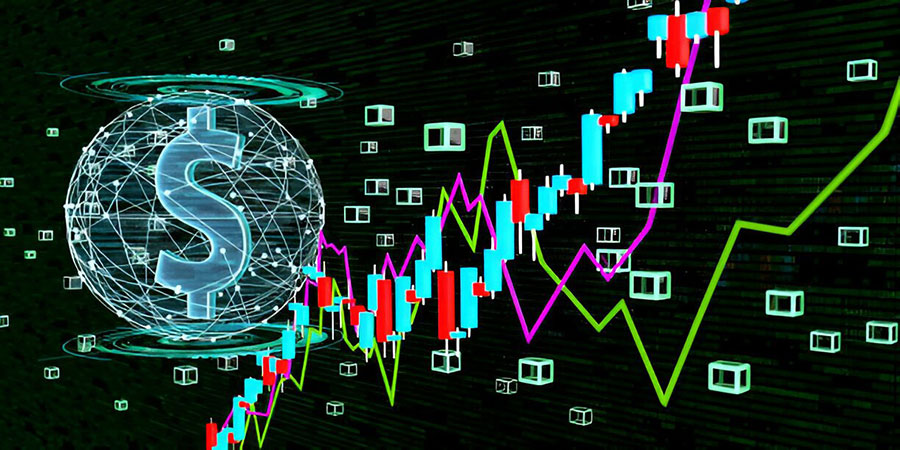
Strategies for Continuous Learning and Improvement:
1. Set Clear Goals:
- Define specific trading goals, such as increasing profitability, reducing losses, or improving risk management.
2. Keep a Trading Journal:
- Regularly journaling trades helps track performance, identify patterns, and learn from both successes and failures.
3. Review and Analyze Trades:
- Regularly review past trades to understand what worked well and what didn’t, identifying areas for improvement.
4. Stay Informed:
- Keep up-to-date with market news, economic events, and geopolitical developments that impact forex futures.
5. Learn from Experts:
- Follow experienced traders, read their insights, and attend webinars or seminars conducted by industry experts.
6. Practice Patience and Discipline:
- Cultivate patience and discipline to avoid impulsive decisions and stick to your trading plan.
Resources for Continuous Learning:
1. Online Courses and Tutorials:
- Platforms like Udemy, Coursera, and Babypips offer courses on forex trading strategies, risk management, and technical analysis.
2. Books:
- Read books written by successful traders and market analysts to gain insights into their strategies and mindset.
3. Forums and Communities:
- Join forex trading communities like Forex Factory and Elite Trader to participate in discussions, share insights, and learn from other traders’ experiences.
4. Trading Podcasts:
- Listen to trading podcasts such as Chat with Traders and The Trading Nut Podcast for interviews with successful traders and insights into their trading journey.
5. Webinars and Seminars:
- Attend webinars and seminars conducted by brokerage firms, trading educators, and industry professionals to learn about the latest trading techniques and market trends.
6. Market Analysis Websites:
- Follow reputable market analysis websites like DailyFX, Investing.com, and ForexLive for daily market analysis, forecasts, and trading insights.
7. Demo Trading:
- Practice trading in a demo account to test new strategies, refine skills, and gain confidence without risking real money.
By consistently applying these strategies and leveraging these resources, traders can continuously improve their skills and adapt to the dynamic nature of the forex futures market.
Common Mistakes in Forex Futures Trading
Detailed Explanations of Common Mistakes
Understanding common mistakes can help traders avoid pitfalls and improve their trading performance.
- Overtrading: Trading too frequently can lead to higher transaction costs and increased risk. Stick to a set number of trades per day or week.
- Ignoring Risk Management: Not setting stop-loss orders or trading with too much leverage can result in significant losses. Always have a risk management plan in place.
- Emotional Trading: Allowing emotions to drive trading decisions often leads to poor outcomes. Use techniques like mindfulness and maintaining a trading journal to manage emotions.
- Lack of a Trading Plan: Trading without a well-defined plan can lead to inconsistent and erratic results. Develop and stick to a comprehensive trading plan.
- Not Keeping Up with News: Ignoring economic events and news can result in missed opportunities or unexpected losses. Stay updated with the latest market news and economic indicators.
Tips to Avoid These Mistakes
- Set Clear Rules: Establish clear trading rules and stick to them.
- Limit Leverage: Use leverage cautiously and set strict limits.
- Regular Review: Regularly review and analyze trades to identify areas for improvement.
- Stay Educated: Continuously learn and stay updated with the latest market developments.
Certificates Required for Forex Futures Trading in Companies
Detailed Information on Certifications
Professional traders looking to work in financial institutions or trading firms often require specific certifications. Here are some of the key certifications:
- Series 3 License
- Overview: The Series 3 exam is administered by the Financial Industry Regulatory Authority (FINRA) and is required for individuals who wish to trade futures and commodities.
- Content: Covers topics such as market fundamentals, trading strategies, and regulatory requirements.
- Preparation: Many online courses and study materials are available to help candidates prepare for the exam.
- Chartered Financial Analyst (CFA)
- Overview: The CFA program is globally recognized and covers a wide range of financial and investment topics.
- Content: Includes ethics, quantitative methods, economics, financial reporting and analysis, corporate finance, equity investments, derivatives, and portfolio management.
- Preparation: Requires significant study time, typically over 300 hours per level, with three levels to complete.
- Certified Financial Planner (CFP)
- Overview: The CFP certification focuses on financial planning and is beneficial for those providing advisory services.
- Content: Covers financial planning, insurance, investments, retirement planning, tax planning, and estate planning.
- Preparation: Requires completion of a CFP Board-registered education program, passing the CFP exam, and fulfilling experience and ethics requirements.
- Financial Risk Manager (FRM)
- Overview: The FRM certification is ideal for those focusing on risk management in trading.
- Content: Covers risk management concepts, financial markets and products, quantitative analysis, valuation and risk models, and current issues in financial markets.
- Preparation: Requires passing two exams and meeting work experience requirements.
Can Forex Futures trading be automated?
Yes, Forex Futures trading can be automated using trading algorithms or robots. These automated systems execute trades based on pre-set criteria, reducing the need for manual intervention. Automated trading can help in executing trades with precision and speed, often outperforming human traders in terms of efficiency.
What are the costs associated with Forex Futures trading?
Costs include spreads, commissions, and fees charged by brokers. It is important to compare these costs among brokers to find the most cost-effective option. Additionally, traders should be aware of any hidden fees, such as account maintenance fees or withdrawal charges, which can affect overall profitability.
How can I improve my trading psychology?
Improving trading psychology involves regular practice, maintaining a trading journal, using mindfulness techniques, and seeking professional help if needed. Traders should focus on developing emotional resilience, managing stress, and avoiding common psychological pitfalls like overconfidence and loss aversion.
What is the role of a Forex Futures broker?
A Forex Futures broker provides the platform and tools necessary for trading, offers market access, and may provide additional services such as educational resources and customer support. Choosing a reliable broker with good customer service and a user-friendly platform is crucial for a smooth trading experience.
How do I choose the best time frame for my trading strategy?
The best time frame depends on your trading style and goals. Day traders typically use shorter time frames (1-minute to 15-minute charts), while swing traders may use longer time frames (4-hour to daily charts). Experimenting with different time frames and analyzing their performance can help in finding the most suitable one.
Are there any regulatory requirements for Forex Futures trading?
Yes, Forex Futures trading is regulated, and traders must comply with the rules set by regulatory bodies such as the Commodity Futures Trading Commission (CFTC) in the US. Adhering to these regulations ensures a fair and transparent trading environment and protects traders from fraudulent practices.
What is the importance of liquidity in Forex Futures trading?
Liquidity is crucial as it affects the ease of entering and exiting trades and the spreads between bid and ask prices. High liquidity ensures smoother and more efficient trading. Liquid markets also tend to have lower volatility, reducing the risk of large, unexpected price swings.
Can Forex Futures trading be combined with other forms of trading?
Yes, Forex Futures trading can be combined with other forms of trading, such as spot forex or options trading, to diversify strategies and manage risk more effectively. Combining different trading methods can help in optimizing returns and balancing the overall risk profile.




